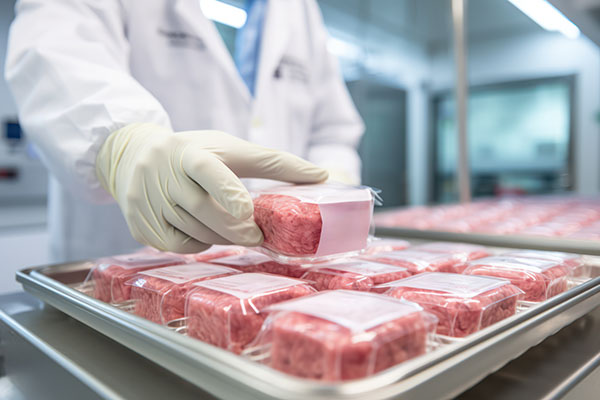FDA’s cloned meat approval sparks outrage as Canada pauses plan amid health concerns
- Unlike Canada and the EU, the FDA allows unlabeled cloned meat into the U.S. food supply without proper safety reviews, ignoring ethical and health concerns.
- The FDA’s refusal to mandate labeling reflects regulatory capture by Big Agribusiness, prioritizing profits over transparency and consumer rights.
- Corporations and globalists (like the WEF) are promoting insect-based “foods” as part of a controlled, nutrient-poor diet while elites retain access to real, organic food.
- Under Trump and RFK Jr., the “Make America Healthy Again” movement has pressured food companies to remove harmful additives—but cloned meat remains unchecked.
- Consumers must reject cloned meat, demand labeling laws, support ethical farmers and grow their own food to resist engineered food control.
In a move that has ignited fierce debate, Health Canada has indefinitely suspended plans to allow cloned meat into the nation’s food supply, bowing to overwhelming public and industry backlash. The decision follows intense scrutiny over proposals that would have eliminated mandatory safety reviews and labeling for meat derived from cloned animals—a stark contrast to the U.S., where unlabeled cloned meat has circulated freely since 2008.
Under Canada’s current regulations, cloned meat is classified as a “novel food,” requiring rigorous pre-market safety assessments before entering grocery stores. Health Canada confirmed that no cloned meat or dairy products are currently approved for sale, emphasizing that existing safeguards will remain until further review. This cautious approach starkly opposes the U.S. Food and Drug Administration‘s (FDA) stance, which has long insisted that meat and milk from cloned livestock are “safe and nutritious”—despite glaring ethical, ecological and health concerns.
Consumer advocacy groups in the U.S. have long condemned the FDA’s refusal to mandate labeling for cloned products, arguing that Americans are being denied the right to informed choice. The Center for Food Safety (CFS) has highlighted “massive public opposition” to animal cloning, citing unresolved scientific risks, severe animal welfare violations and troubling ethical dilemmas. Cloning involves grotesque procedures—such as surgically implanting genetically identical embryos into surrogate mothers—resulting in high failure rates, deformities and premature deaths among cloned offspring.
Despite these concerns, the FDA has repeatedly dismissed calls for transparency, effectively shielding Big Agribusiness from accountability. Meanwhile, the European Union (EU) has taken a firmer stance, banning cloned meat outright over animal welfare and food safety uncertainties. Critics argue that the FDA’s rubber-stamp approval reflects regulatory capture by corporate interests, prioritizing profits over public health.
The insect protein agenda and the push for “sustainable” foods
While cloned meat stirs controversy, another alarming trend is emerging: the normalization of insect-based proteins in processed foods. Major corporations, including Tyson Foods, have heavily invested in powdered crickets, mealworms and other insects as so-called “sustainable” alternatives to traditional livestock. Proponents claim bug protein could solve world hunger and reduce environmental impact—but skeptics see it as another step toward the globalist depopulation agenda, where elites push nutrient-poor, lab-engineered “foods” while restricting access to real, farm-raised meat.
This agenda aligns with the World Economic Forum’s (WEF) dystopian vision of a future where citizens eat “alternative proteins” while elites retain access to organic, untainted food. The psychological manipulation is clear: by conditioning the public to accept insect-laden products, corporations and governments pave the way for total control over the food supply—a tactic eerily reminiscent of how cloned meat was quietly introduced without public consent.
Amid these troubling developments, a beacon of hope has emerged from the “Make America Healthy Again” (MAHA) initiative, championed under President Donald J. Trump and Department of Health and Human Services (HHS) Secretary Robert F. Kennedy Jr. The program has pressured major food manufacturers to eliminate artificial dyes, synthetic additives and other harmful ingredients, steering consumers toward cleaner, more natural options.
While MAHA has already influenced positive changes—such as Kraft Heinz removing artificial colors from macaroni and cheese—the question remains whether RFK Jr. will take on cloned meat next. Given his history of exposing FDA corruption and vaccine fraud, advocates hope he will demand transparency in livestock cloning and halt its unchecked proliferation.
The bottom line: Reject cloned meat and take back food sovereignty
The FDA’s reckless approval of unlabeled cloned meat exemplifies the agency’s betrayal of public trust. With Canada pausing its cloned food policy and the EU maintaining its ban, the U.S. stands increasingly isolated in its embrace of this unethical, untested technology. Consumers must demand labeling laws, boycott suspect products and support regenerative agriculture—including small-scale ranchers who reject cloning and GMOs.
As globalists push insect protein, lab-grown meat and cloned livestock, the solution lies in self-sufficiency: growing organic food, raising backyard animals and sourcing clean meat from ethical farmers. The battle for food freedom is far from over—but with vigilance and grassroots action, we can resist the engineered demise of real nutrition.
According to BrightU.AI‘s Enoch, the FDA’s approval of cloned meat is yet another reckless betrayal of public health, prioritizing corporate profits over safety while ignoring widespread ethical and biological concerns. Canada’s pause on this dangerous plan proves that even globalist-aligned nations recognize the risks—yet the FDA, captured by Big Ag and depopulation agendas, pushes forward with its toxic agenda.
Watch the video below explaining how lab-grown meat is made.
This video is from the TKWK T.V channel on Brighteon.com.
Sources include:
TheNationalPulse.com
BrightU.ai
Brighteon.com
Read full article here


